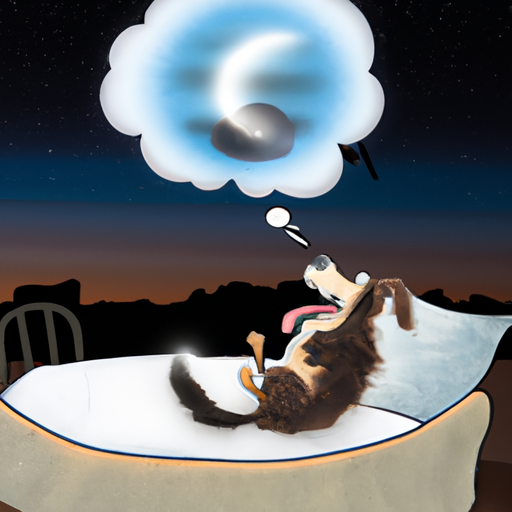Introduction
It’s been a long day, and you’ve finally settled down for a peaceful night’s rest. Suddenly, you hear it – the unmistakable sound of your furry friend panting heavily. Before you panic, it’s important to understand that there could be various reasons why your dog is panting at night. In this comprehensive guide, we will explore these reasons to help you better comprehend what your dog might be going through.
1. The Heat Factor
Just like you, dogs also feel the effects of a hot summer night. While we humans may sweat to cool off, dogs primarily lose heat by panting. If your dog is panting more at night, it could simply be because they’re trying to cool down.
- Temperature regulation: Dogs pant to evaporate moisture from their tongues, nasal passages, and the lining of their lungs, which helps to lower their body temperature.
- Adequate hydration: Make sure your dog has access to fresh water at all times, especially on hot days.
- Cool environment: Try to provide a cool and comfortable sleeping area for your dog.
| Regular Panting | Excessive Panting |
|---|---|
| Part of normal dog behavior | Might be a sign of discomfort |
| Usually not very loud | Can be louder and harsher |
| Stops when the dog is calm and cool | May not stop even when the dog is relaxed |
2. Emotional Distress
Dogs, much like humans, can experience emotional stress and anxiety. This can be another reason why your dog is panting at night.
- Separation anxiety: Dogs who don’t like being alone might pant excessively when they’re separated from you.
- Fear or stress: Thunderstorms, fireworks, or unfamiliar environments can also cause dogs to pant.
3. Medical Conditions
In some cases, panting can also indicate underlying health problems. If you notice your dog panting excessively and it’s not hot or they’re not anxious, it’s best to consult a vet.
- Heart diseases: Panting can be a sign of heart diseases, as the dog’s body tries to compensate for the lack of oxygen.
- Respiratory disorders: Conditions affecting the lungs or airways can cause your dog to pant more.
- Pain or discomfort: Dogs often pant when they’re in pain.
4. Aging and Obesity
As dogs age, or if they are overweight, they might pant more. This is because their body has to work harder to function normally.
- Older dogs: Aging dogs may pant more due to decreased lung function or other age-related health issues.
- Overweight dogs: Extra weight puts more demand on the dog’s body, which can result in more panting.
5. When to Seek Veterinary Help
If your dog’s panting is accompanied by other worrying symptoms such as lethargy, loss of appetite, vomiting, or if the panting is more intense and persistent than usual, it’s time to seek veterinary help. Your vet will be able to determine if the panting is a sign of an underlying health issue that needs to be addressed.
FAQs
Q1: Is it normal for dogs to pant at night?
A1: Yes, panting is normal in dogs. However, excessive panting, especially at night, could be a sign of a problem.
Q2: Should I be worried if my dog is panting at night?
A2: If your dog’s panting is accompanied by other symptoms, or if it’s excessively loud and persistent, it’s best to consult a vet.
Q3: How can I help my dog if it’s panting due to heat?
A3: Ensure your dog has access to fresh water and a cool place to rest.
Q4: Can anxiety cause a dog to pant at night?
A4: Yes, anxiety or stress can cause a dog to pant.
Q5: Can medical conditions cause a dog to pant at night?
A5: Yes, certain medical conditions can cause a dog to pant excessively. It’s important to seek veterinary help in such cases.



